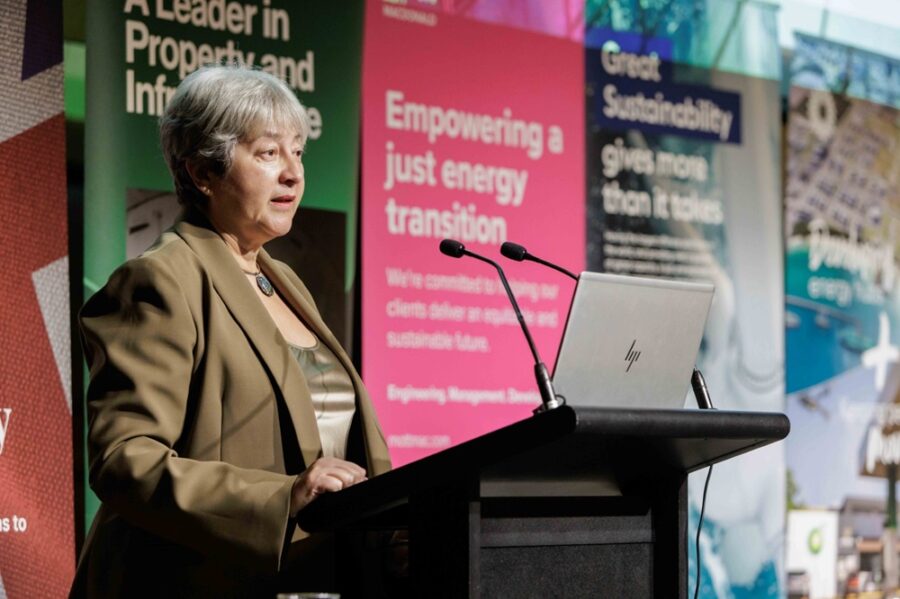13th May 2024 Canberra, Australia
Value with Values: UK Commitment to Climate Partnership

The UK is committed to strengthening the UK-Australia climate partnership and collaborating internationally to tackle climate change and ensure energy security. With rising temperatures and worsened extreme weather events leaving people hungry and forcing them from their homes, these challenges cannot be ignored.
Last week, I addressed key players across industry and government at the Australian British Chamber of Commerce’s Energy Transition and Investment Summit. This vital event in Sydney built on the momentum created by the Chamber’s successful Catalyst last year in the UK. I shared lessons from the UK’s clean energy transition leadership, and our ambition for a thriving green economy founded on affordable, reliable and abundant energy to generate growth, jobs and prosperity.
I was also delighted to publicly announce, with Chris Bowen, Australia’s Minister for Climate Change and Energy, present, the UK’s endorsement of Australia’s bid to host COP31 in partnership with Pacific nations.
This builds on our strong climate partnership with Australia and our focus on supporting Small Island Developing States, including Pacific Island Countries, who are on the frontline of the effects of climate change.
In 2021, the UK hosted COP26 and delivered the Glasgow Climate Pact, a global agreement to accelerate action on climate change this decade. We look forward to using our experience of hosting COP26 to support Australia and Pacific nations in their bid to deliver an ambitious COP31 that delivers for the Pacific and for Small Island Developing States.
The UK and British businesses are well-placed to support Australia’s energy transition with an impressive track record of net zero commitments. In 2019, the UK became the first major economy in the world to pass laws to end our contribution to global warming by 2050. We have set more ambitious 2030 targets with plans to cut emissions by 68% by 2030. This is more than the EU, Japan, or the US.
In Australia, we have seen a positive trajectory under Labor and Minister Bowen’s climate change and energy leadership, with the promise of a new 2035 target before the next election. The Climate Change Authority suggests that a 65-75% emissions reduction by 2035 against 2005 levels could be in reach.
We stand ready to assist Australia in reaching these targets. The UK was the first major economy to halve its emissions, cutting them by 50% between 1990 and 2022, while also growing our economy by 79%. In 2012, coal provided almost 40% of UK electricity, but later this year, this will be zero. In fact, renewables now account for more than 40% of the UK’s electricity, up from just 7% in 2010.
Critical minerals are an important pillar of our relationship with Australia. To continue moving in the right direction, we must be able to access the critical minerals required for clean energy technologies. Just as iron and coal were central to the Industrial Revolution, critical minerals are essential to our Green Industrial Revolution.
International cooperation is key to addressing challenges associated with energy transition, and our Ministers are committed to strengthening the UK-Australia climate partnership. We are already collaborating in areas such as clean hydrogen, offshore wind, and to secure investments required to fund these important projects.
Last year, the UK Government launched a report with Arup highlighting the significant opportunities for the UK to share its offshore wind expertise with Australia’s developing industry. While different in scale, Australia and the UK are both island nations blessed with strong offshore wind resources. With feasibility licences recently awarded for Gippsland, Victoria has potential to deliver over 25GW and set up Australia to become a globally significant player in the offshore wind market.
The UK is the world’s second largest offshore wind market with 13.7GW of projects accounting for 24% of global capacity in 2022 and making it one of the most important contributors to net zero in the UK. Offshore wind has played an important role in the development of regional economies in the UK too. The sector currently employs 32,000 people but will need to grow to 104,000 people by 2030 to meet the 50GW target.
Looking to hydrogen, we will soon be releasing a report by Xodus on the feasibility of hydrogen production in Australia and the UK’s ability to contribute. To support hydrogen research and development, the UK and Australia are collaborating on the Renewable Hydrogen Innovation Partnership Programme and at COP28 announced the opening of applications giving UK and Australian organisations the opportunity to apply for funds to work collaboratively.
Australian private investment is backing the UK’s green infrastructure. In November, IFM Investors and Aware Super announced a combined £15 billion of investments in areas including energy infrastructure and innovation. Conversely, Scottish companies supporting Australia’s energy transition already include Flotation Energy, Wood, and Agrekko.
The UK-Australia Free Trade Agreement (FTA) promotes these strong existing ties between our counties by enforcing domestic environmental laws and cooperation on trade-related environmental challenges like overfishing and illegal wildlife trade. The FTA has also established the Environment Working Group and the Strategic Innovation Dialogue which have further promoted cooperation in areas such as electric vehicles, offshore wind, and hydrogen.
Whether we are working together at COP summits to deliver 1.5 Paris targets, joining like-minded countries in the Umbrella Group, researching collaboratively, or supporting each other’s energy transitions through trade and investment, the UK-Australia climate partnership continues to strengthen.
I am excited to see what we can achieve together, not just for our own nations, but for the global good and our most vulnerable neighbours in the region as well.
